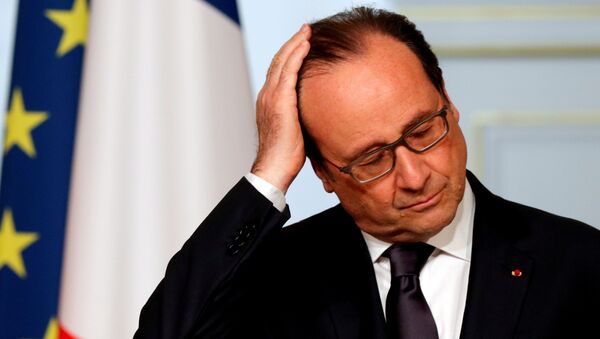Earlier this week, Speaker of the French National Assembly Claude Bartolone officially submitted to the Elysee Palace a draft resolution for Hollande's impeachment.
The resolution was provoked by the release in October of a controversial book entitled "A President Should Not Say That: Secrets of Five Years in Office." It was written by French investigative journalists Gerard Davet and Fabrice Lhomme.
France: opposition party starts impeachment process against president Hollande for disclosing state secrets https://t.co/SYSXpq1Ubl
— Stefan de Vries (@stefandevries) 11 ноября 2016 г.
The book records dozens of Hollande's private conversations with journalists including the president's comments on the French airstrikes in Syria and his admission that he personally ordered the assassination of enemies of the state.
However, just a month after the release Hollande backtracked on his confessions and said he gave no assassination orders. The president said he issued only surveillance and "neutralization" orders.
As a result, right-wing parliamentarians have accused Hollande of disclosing classified information and want his impeachment.
The International Criminal Court stipulates that deliberate murder approved by authorities and committed by in the context of an armed conflict is a war crime.
In an interview with Sputnik, lawyer Celine Bardet, who is also an expert on justice- and war crimes-related issues, said that it seems that President Hollande "more or less knew what he was talking about."
"I do not know exactly but I think that it was the disclosure of a state military secret. In any case, a premeditated murder is a violation of international law, period. It is something that cannot even be discussed at the International Criminal Court," she said.
Bardet was echoed by lawyer Gilles Devers who told Sputnik that there are clear-cut definitions in domestic and international law when it comes to first-degree murder.
"[This can be justified] by a war situation and only if the person is in the position of a combatant, otherwise it is called [a premeditated murder]. This definition, which was formulated a long time ago, is included in the best source of international law, namely, the status of the International Criminal Court, ratified by France," he said.
The second aspect is sentencing a person to death without giving him the opportunity to defend himself through the legal process, according to Devers.
"Actually, we decide to kill a person based on computer data," he added.
Earlier, member of the French National Assembly Nicolas Dhuicq told Sputnik that a draft resolution to the High Court calling for the impeachment of President Hollande may be blocked by the Socialist Party lawmakers before it reaches the parliament.
Under the existing rules, a president can be removed from office only by a two-thirds majority of both chambers of the parliament.
Hollande's Socialist Party controls 51 percent of the National Assembly seats, and 37 percent of the Senate. In addition, the motion must also be approved by France's committee on laws before it reaches parliament.





